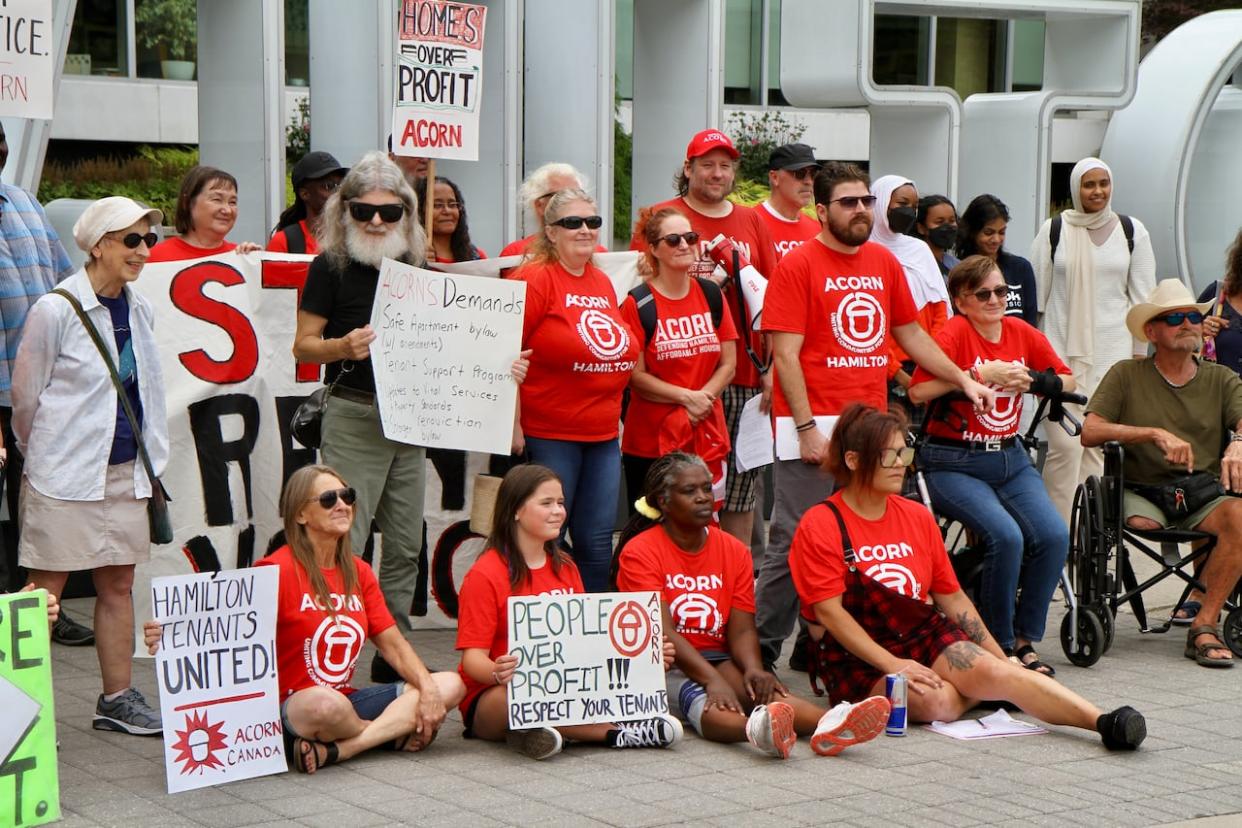Hamilton to become 1st Ontario city with bylaw to stop 'bad faith' renovictions

Hamilton will soon be the first municipality in Ontario to enforce a renovictions bylaw designed to deter landlords from bad faith evictions and better protect tenants living in affordable units.
After more than a year of work and multiple drafts, city staff presented their latest version of the bylaw to councillors on Wednesday, who voted unanimously in support.
Coun. Nrinder Nann (Ward 3), who has pushed for the bylaw for years, addressed tenants in the council chamber.
"We see you and we've heard you, and cities can do something," said Nann.
"And honestly, I can't think of a better love letter to our neighbours who rent to affirm the fact you matter and you're valued as Hamiltonians."

Coun. Nrinder Nann has been pushing for a bylaw cracking down on bad faith renovictions in Hamilton for years. (Alex Lupul/CBC)
Hamilton has seen a 983 per cent increase in the number of renoviction notices, N13s, issued to tenants between 2017 and 2022, Monica Ciriello, director of licensing and bylaw enforcement, told councillors last year.
Landlords are allowed to issue eviction notices to tenants if they think units need to be vacant for renovation and repairs to be done safely. In Ontario, Tenants have the right to move back in afterwards, at the same rate.
City staff described "bad faith" renovictions as when the landlord uses the excuse of renovations to make existing tenants leave and then rent the unit to new tenants at a higher rate.
Landlords rarely face penalties for illegally renovicting tenants or not upholding their right to return, as previously reported by CBC News.
The new bylaw is needed to ensure renovictions are actually necessary and tenant rights are upheld, Ciriello said on Wednesday.
Experts, advocates praise bylaw
Colleen Langmead lives in an east Hamilton building where she and other tenants were given an N13 notice by the landlord last summer, she told councillors.
"That's when the bottom fell out of my world," she said. "I cannot articulate the stress and anxiety for residents."
She relies on disability support payments and cannot afford a unit at market rent. She said the landlord has neglected the building for months, including not collecting garbage, to compel tenants to leave, and doesn't actually need her unit to be vacant to complete the proposed renovations.
Langmead also doesn't trust her landlord to allow her to return to her unit once the renovation is complete, which is why she supports the renovictions bylaw, she said.
"Please support strong protections for the city's most vulnerable citizens — people like me," she said.
Housing Prof. Brian Doucet, from the University of Waterloo, said the proposed bylaw will discourage landlords from unjustly evicting tenants. Other municipalities, such as the Region of Waterloo, are considering similar bylaws, based on the work being done in Hamilton.
"You're blazing a trail others in Ontario will soon follow," Doucet told councillors on Wednesday. "The momentum is starting to build."
Lawyer Karen Andrews with the Advocacy Centre for Tenants Ontario also praised the bylaw as one that will eliminate renoviction "scams" while allowing "honest" landlords to carry out improvements on their property.
"You have made great strides in fixing a terrible problem," Andrews said.
Mayor Andrea Horwath and Coun. Mike Spadafora abstained from voting, citing a conflict of interest as they're both landlords.
At least one group representing landlords and property managers has spoken out against the bylaw.
In a letter to the city last year, the Hamilton and District Apartment Association said while its members "do believe that there should be resources and protections in place for bad faith renovictions," they said city funds would be better spent on "improving their own housing stock," rather than managing the bylaw.
"The Residential Tenancies Act has many protections for tenants already and with Bill 97 [the Helping Homebuyers, Protecting Tenants Act] those protections have been extensively enhanced. Should tenants know their rights and the protections provided to them under the Act, we would hope the negative connotation towards renovictions would slowly cease," the group wrote.
How it will work
Because the vote occurred during a General Issues Committee meeting, council will give final approval later this month and then the program will begin in a year.
It will require a landlord to apply for a city renovation licence within seven days of issuing an eviction notice to a tenant, says the proposed bylaw. The licence fee will be $715 per unit, and $125 to renew annually.
The city will only allow the eviction and renovations to take place if the landlord has already secured all building permits to complete the work and provides an engineer's report confirming vacancy is necessary, the bylaw says. The landlord will also need to make arrangements with any tenant who wants to return to their unit once the renovation is complete.
These arrangements could include providing the tenant with temporary accommodations, comparable to their current unit and rental rate, or compensation, the bylaw says.

Hamilton will be the first municipality in Ontario with a renovictions bylaw, and the only one outside of B.C. (Alex Lupul/CBC)
After the renovation is complete, the landlord will be required to adhere with the Residential Tenancies Act and allow the tenant to return to their unit at the same rate they were paying before the work was done, the bylaw says.
If landlords don't comply with the bylaw, they could be fined up to $500 per unit per day, plus administrative fines that will be determined by council later, Ciriello told councillors. Enforcement would start next January.
The city expects licence fees will cover about 10 per cent of the costs to run the program including for bylaw officers, legal and housing staff, vehicles and outreach. Taxpayers will cover the rest, over $800,000 a year.
The cost for the program will need to be approved through the ongoing 2024 budget process.
Ciriello said tenants will receive information about their rights — posted in buildings and delivered as information packages — including how to inform the city they've received an N13 notice to ensure the landlord has applied for a renovation licence.


